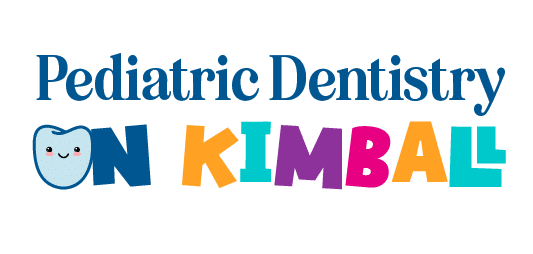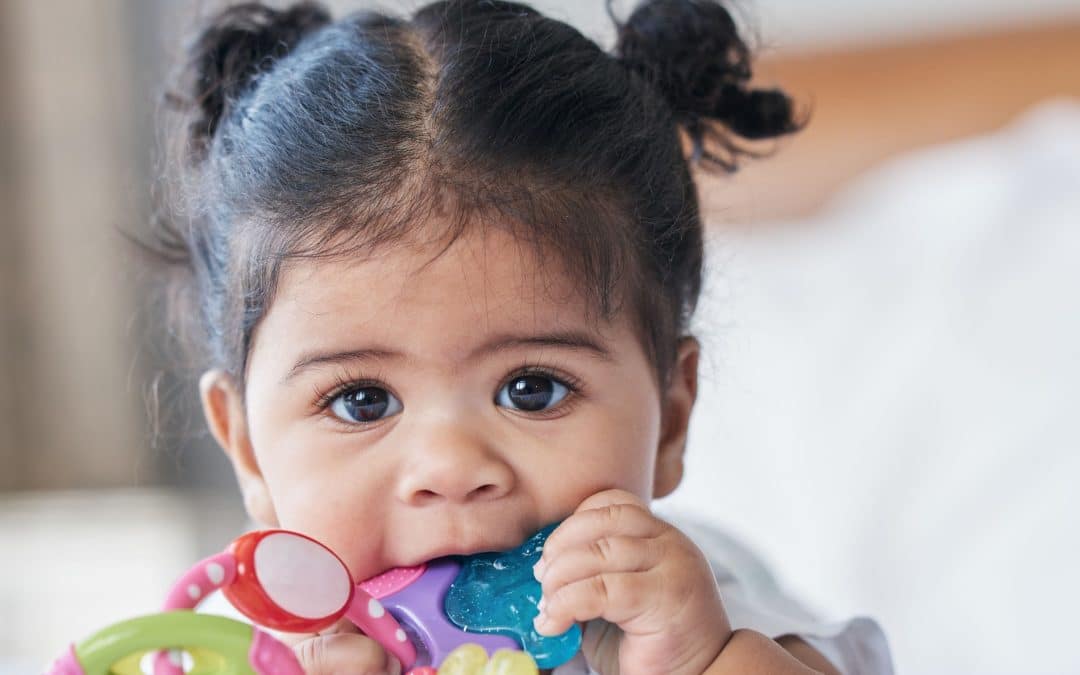This Article Will Address:
- When to expect your baby’s first teeth
- Common signs of teething and how to ease discomfort
- Why teething may seem worse at night
- What to do if your baby’s teeth aren’t falling out
- When to schedule your child’s first dental visit
- When Brooklyn parents should call a pediatric dentist
- A helpful tooth eruption timeline chart
- Safe, practical teething comfort tips
Understanding Teething: What Brooklyn Parents Should Know
At Pediatric Dentistry on Kimball in Brooklyn, NY, we know that teething is one of the earliest—and most talked about—milestones in your child’s development. It’s a moment of excitement and growth, but it can also raise questions: When will it start? How can I help my baby through the discomfort? Is this normal?
Under the guidance of Dr. Lionel Vera, our goal is to answer those questions with honesty, empathy, and clear education. We’re here to help parents in Brooklyn support their child’s growing smile every step of the way.
Have questions about your baby’s teeth? We’re here to help—step by step.
When Should I Expect My Baby’s First Teeth?
Most babies begin teething around 6 months old, but it can happen anytime between 3 to 12 months. Some little ones are even born with teeth—known as natal teeth—which are rare and usually harmless.
Typical Teething Timeline:
- Lower Central Incisors: 6–10 months
- Upper Central Incisors: 8–12 months
- Lateral Incisors: 9–13 months
- First Molars: 13–19 months
- Canines (Cuspids): 16–22 months
- Second Molars: 23–33 months
Tracking your child’s tooth development can help ease concern and prepare for what’s next. Ask us about our downloadable Brooklyn Teething Timeline Chart at your next visit!
What Are the Common Signs of Teething?
Teething affects every baby a little differently, but these symptoms are typical:
- Excessive drooling
- Tender or swollen gums
- Chewing or biting objects
- Fussiness or irritability
- Disrupted sleep or nap routines
- Mild temperature (not higher than 100.4°F)
Important Note:
Fever over 100.4°F, diarrhea, or rash are not typical teething symptoms. These may signal an unrelated illness and should be evaluated by your pediatrician.
Not sure if it’s teething? Call our Brooklyn pediatric dental office for an infant evaluation. We’re here to help.
Is Teething Worse at Night?
Yes—and you’re not imagining it. Many parents find that their baby’s teething symptoms intensify at night. Why? There are fewer distractions, and babies are more aware of discomfort when trying to rest.
Tips to Soothe Teething at Night:
- Offer a chilled (not frozen) teething ring
- Gently massage your baby’s gums
- Maintain a consistent sleep routine
- Use white noise or soft music to help calm them
- Ask your pediatric dentist before using over-the-counter pain relief
If teething pain is severely affecting sleep or feeding, don’t wait—Dr. Vera can help evaluate your baby’s comfort and needs.
What Do I Do If My Baby’s Teeth Aren’t Falling Out?
Around age 6 or 7, children begin losing their baby teeth. But every child’s pace is different.
If your child’s baby teeth aren’t falling out, or if permanent teeth are growing in behind baby teeth (also known as “shark teeth”), it may be time for an evaluation.
Common reasons baby teeth don’t fall out:
- Delayed eruption of permanent teeth
- Dental crowding
- Congenitally missing adult teeth
- Prior trauma to the area
Don’t panic— in many cases, baby teeth fall out on their own. But if they linger longer than expected, Dr. Lionel Vera can assess whether gentle intervention is needed.
Should I Bring My Baby to the Dentist Once They Get Their First Teeth?
Yes, and it’s one of the best decisions you can make for their lifelong dental health.
The American Academy of Pediatric Dentistry recommends that children see a dentist by their first birthday or within six months of their first tooth appearing.
Benefits of an early dental visit:
- Catch early signs of tooth decay
- Get personalized brushing and teething advice
- Build trust and familiarity with the dentist
- Lay the foundation for anxiety-free care
At Pediatric Dentistry on Kimball, we specialize in first-time visits and helping young patients feel safe, seen, and supported from day one.
Schedule your baby’s first dental visit today. We offer after-school and weekend appointments!
Brooklyn Parents – When Should You Call a Pediatric Dentist About Teething?
While most teething symptoms are manageable at home, there are times when a professional evaluation is the best next step.
Call us if your baby:
- Hasn’t erupted any teeth by 18 months
- Has swollen, bleeding, or pus-filled gums
- Is losing significant sleep or refusing to eat
- Has retained baby teeth past age 7
Even if you’re unsure, a quick call to our team at Pediatric Dentistry on Kimball can offer peace of mind.
Teething Timeline Chart
Tracking tooth development can ease anxiety and give you a clearer picture of what’s to come.
| Tooth Type | Eruption Age | Shedding Age |
| Lower Central Incisors | 6–10 months | 6–7 years |
| Upper Central Incisors | 8–12 months | 6–7 years |
| Lateral Incisors | 9–13 months | 7–8 years |
| First Molars | 13–19 months | 9–11 years |
| Canines (Cuspids) | 16–22 months | 10–12 years |
| Second Molars | 23–33 months | 10–12 years |
Tips to Comfort a Teething Baby
Soothing a teething baby takes patience and creativity. These tips have helped many Brooklyn parents just like you:
- Gently massage the gums with a clean finger
- Offer chilled (not frozen) teething rings
- Let your baby chew on a damp, chilled washcloth
- Avoid hard or sharp-edged toys and foods
- Stay consistent with sleep and feeding routines
- Ask your dentist before using teething gels or medications
Supporting Your Baby’s Smile, From the First Tooth On
Teething can feel overwhelming, but it’s also the beginning of a lifelong journey toward a healthy smile. At Pediatric Dentistry on Kimball, we’re here to support you and your child with expert guidance, gentle care, and a positive experience, every step of the way.
Ready to get started?
Schedule your child’s first dental visit at Pediatric Dentistry on Kimball in Brooklyn, NY—and let’s make their early smile a healthy one.
Sources:
- American Academy of Pediatric Dentistry
- Cleveland Clinic – Teething
- Orajel Kids – Teething Chart
- Healthy Children – Baby’s First Tooth

Dr. Lionel Vera
Dr. Lionel Vera brings warmth, expertise, and advocacy to Pediatric Dentistry on Kimball as a board-certified pediatric dentist. He earned his dental degree from the University of Puerto Rico, Medical Science Campus, followed by a residency at Kingsbrook Jewish Medical Center, where he honed his skills with children and special needs patients. A Brooklyn-based pediatric dentist since 2018, Dr. Vera blends compassionate care with a strong focus on educating both children and parents about oral health. Dr. Vera’s mission: to inspire a lifetime of healthy smiles through trust, education, and proactive care.

